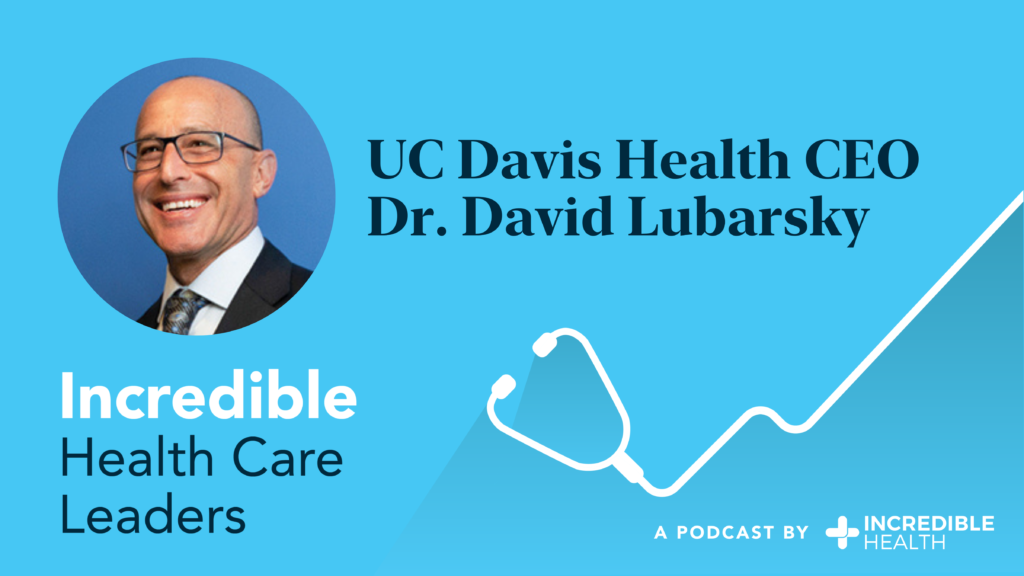Recorded April, 2021
Dr. David Lubarsky is the Chief Executive Officer for UC Davis Health and Vice Chancellor of Human Health Sciences. UC Davis Health employs over 16,000 people, has an operating budget of $3 billion, approximately 1 million outpatient visits each year, and the UC Davis Medical Center is consistently ranked among the nation’s best by US News and World Report.
He shares that the vaccine rollout in California has created an “anti-equity backlog,” because patients who have “vaccine hesitancy or don’t have access to computers” aren’t signing up for the vaccine.
For Dr. Lubarsky, “the problem with the vaccine rollout is that healthcare providers have been disintermediated.”
Nurses and physicians were not allowed to administer the vaccine to their patients. They were told, “You can’t call in your patients. You can’t make judgment decisions on behalf of the patients.”
He advocates for a focused effort to encourage the underserved to get the vaccine, because with better information, “we would see vaccination rates equal to that of the white population.”
In addition to targeted campaigns to encourage the underserved to get vaccinated, he advocates for vaccine benefits, “where vaccinated people get to do things unvaccinated people don’t, If we really want to move the needle.”
He argues that “everybody should be doing everything humanly possible to promote vaccinations,” because “it’s not only herd immunity we’re trying to achieve, we’re trying to achieve herd mentality around the idea that the vaccine is safe.”
He talked through how he navigated the pressures of the pandemic, especially the uncertainty. He shared that the biggest lesson for him was to “always be transparent and trust in your people.”
His leadership philosophy was to treat everyone in the organization “like adults, and not try to hide the difficulties from them, but trust them to help.”
Despite some concern that it might “panic the troops,” he was honest because “healthcare workers are incredibly resilient” and being truthful “was always the right thing to do.”
Dr. Lubarsky also discussed why UC Davis Health is such an excellent place for nurses to work. He shared, “nurses should work for us because of Toby Marsh, my Chief Nursing Officer. This man has been on a quest to deliver the finest core of nurses anywhere in the world.”
In addition to their repeated Magnet® designation, more than 40% of UC Davis Health nurses have additional certifications in their subspecialty areas, which is well above the national average. They also have “some of the best mortality statistics in the United States.”

Dr. Lubarsky is a professor in the UC Davis Betty Irene Moore School Of Nursing, “and it’s not an honorary appointment. I’m really proud of our school of nursing. Their graduate programs were ranked 24th in the United States this year.”
In addition to hiring nurses who graduate from their nursing school, UC Davis Health partners with Incredible Health to hire permanent, experienced nurses.
According to Dr. Lubarsky, “Incredible Health is actually patient facing, because when you deliver a nurse who wants to be at the bedside that they’re at, patient engagement goes up.
“Effectiveness of prescribed medical therapies goes up. Recovery goes up. The entire workforce’s morale goes up when people are happy at their workplace.
“Having the match.com of nursing working for us is the same as having Incredible Health working for our patients.”
In addition to discussing innovation in nurse hiring, Dr. Lubarsky discussed innovation in direct patient care, especially in artificial intelligence and machine learning (AI/ML), “always on” medicine, robotics, and gene therapies.
He is a firm believer in data analysis and big data. He believes in “the idea of collecting patient data and overlaying AI and ML to derive intelligence, wisdom, and predictive power.”
UC Davis Health has an AI/ML center, as well as a new Chief Information and Digital Health Officer, Ashish Atreja, who’s leading this effort.
Dr. Lubarsky predicts “in the future, medicine will be “always on.” Meaning patients’ vital signs will be constantly monitored by devices in their homes, and you’ll only see a human healthcare provider when your devices tell you you’re a little out of your norm.”
Similar to many other industries, Dr. Lubarsky believes in the coming years healthcare will see a shift to robotics. “We’re going to see a lot of things done without human interaction, in a way that many other industries have already adopted.”
Finally, medicine as we know it will fundamentally shift.
He shares, “medicine is going to be from the inside out. We are really investing in cell and gene therapy so that you’ll never have to take a pill again. We’re going to fix your genes. And you’re going to heal yourself from the inside out. That’s where medicine is going.”
